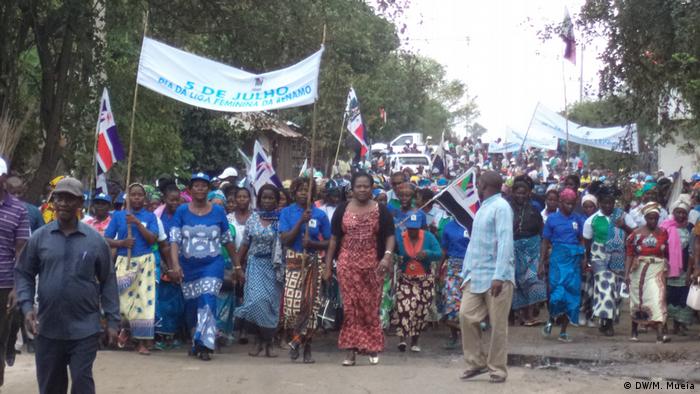Mozambique: Government says "very intensive" investigation into kidnapping of Portuguese ...
DDR: Former Renamo women guerrillas demand government support

Image: DW
Former Renamo combatants are dissatisfied with the failure of the Mozambican government and partners to fulfil promises made in the scope of the DDR disarmament, demobilisation and reintegration process.
“When we were demobilised, we were promised subsidies for a year and they were going to start an automatic pension, but so far it’s not happening,” one former woman combatant complains.
The former women fighters expressed their displeasure during the Women’s Conference on Peace and Security in Beira. They are part of a group of more than 250 demobilised women who have been back in civilian life for more than two years.
According to them, they only received the first tranche of support, valued at 10,000 meticais (about €158.00), construction material and some basic utensils, on the day they left the bases to move on to their civilian life. A life without weapons and with profitable projects, provided for in the fund donated by international partners in the DDR package.
Future without answers
Antonieta Gonzaga, for example, submitted a project, but to date has not had a response. She had hoped to see her children educated through DDR-funded scholarships.
“We were promised projects, and that those who have children would receive scholarships, but there is no project that I have seen here in the city,” she says.
The pacification process in Mozambique took a new direction in June 2020. So far, 70% of the more than 5,000 combatants have already been demobilised and are already in civilian life. But not all are satisfied. On behalf of several women, Virgínia Tauzene reports that the lack of support affects both women and men.
“The first group is already turning two years old [since demobilisation]; there are other groups that are completing one year and a few months,” she explains. The former combatant also claims that the “Renamo men” who are being “reintegrated and demobilised” are not receiving anything after the subsidy ends.
READ: Mozambique: Renamo women fighters demobilised
Tauzene recalls, during the military process, being assured that, after the end of the subsidies, they would receive support for projects, help that is yet to come. “We are waiting until this day. I, for example, am completing one year and six months since demobilisation with nothing,” she says.
Unsupported women and men
Tauzene says some demobilised men, who are heads of families, had to sell part of their assets to pay their rent, and hoped to compensate with amounts receivable in subsequent months.
caption – Former RENAMO guerrillas demand support
“The goods they received from the DDR in the camp they ended up selling, because there was no way to rent a house with no money, so they didn’t have a place to live,” she explains.
“Without money, without accommodation, how are you going to live, what kind of life are you going to lead? You are seen like nobody else, even the men who are leaving the bases are not being respected, because they have nothing,” she concludes.
Women continue to be excluded
One person listening closely to the complaints of the women the government has turned its back on is the Swedish ambassador to Mozambique, Mette Sunnergren, who believes that the exclusion of women in the DDR process could compromise the chances of lasting peace in the country.
The diplomat spoke of the need to close the last three Renamo bases and of gender equality as essential to achieving the government’s objectives of peace, security and sustainable development.
“We are aware that it is not possible to achieve lasting peace as long as women, who are the majority, are excluded in the process,” the Swedish diplomat highlights.
In August, during the closing of the former Renamo base in Montepuez, Cabo Delgado province, the special envoy of the UN Secretary General, Mirko Manzoni, revealed that the DDR process had now encompassed about 77% of the beneficiaries.












Leave a Reply
Be the First to Comment!
You must be logged in to post a comment.
You must be logged in to post a comment.